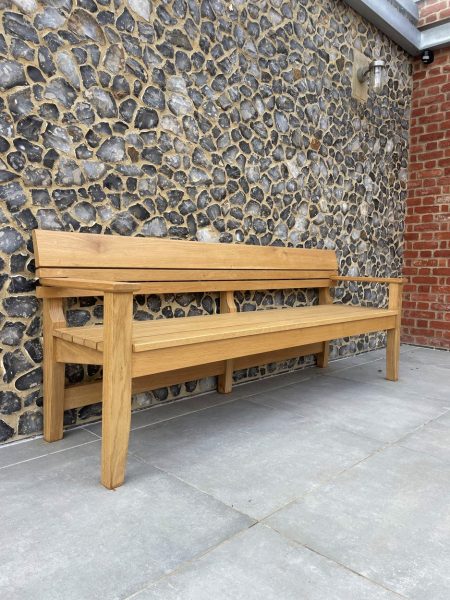What are the Public Street Furniture Regulations UK?

Public street furniture plays a vital role in creating functional, safe, and aesthetically pleasing urban spaces. From benches and bollards to planters and cycle stands, these elements improve accessibility and encourage community interaction. However, installing street furniture in the UK is not as simple as placing items in a public space. It must comply with strict regulations to ensure safety, accessibility, and durability.
In this guide, we’ll cover the key UK regulations and standards governing public street furniture, including the Highways Act 1980, Equality Act 2010, planning permissions, pavement licences, and design requirements.
Why Compliance with Street Furniture Regulations Matters
Street furniture that does not meet legal and design standards can create hazards, restrict pedestrian movement, and even lead to legal liabilities for local authorities or businesses. Ensuring compliance guarantees:
- Public safety – Prevents obstructions and trip hazards.
- Accessibility – Makes streets usable for everyone, including those with disabilities.
- Durability – Reduces long-term maintenance costs.
- Legal protection – Avoids fines and enforcement action.

Key UK Regulations Governing Public Street Furniture
-
The Highways Act 1980
The Highways Act 1980 is the primary legislation governing what can and cannot be placed on public highways in England and Wales. It ensures that street furniture does not obstruct the highway or pose risks to pedestrians and vehicles.
- Section 115E allows local authorities to permit structures, such as seating or barriers, provided they do not cause danger or obstruction.
- Any street furniture installed without permission may be removed by the local authority, and costs can be recovered from the party responsible.
Before installing items like bollards, benches, or cycle racks, always seek approval from your local council to comply with this Act.
-
Equality Act 2010 and Accessibility Standards
Public spaces must be inclusive and accessible to all, as required under the Equality Act 2010. This means street furniture must not create barriers for people with disabilities, including wheelchair users and those with visual impairments.
Key considerations include:
- Tactile paving and clear footpaths – Street furniture should not block tactile guidance routes.
- Adequate clearance – Maintain at least 1.5 metres of unobstructed footway for pedestrians.
- Accessible seating – Provide benches with armrests and appropriate seat height for those with mobility issues.
Failure to meet these standards can result in legal challenges and non-compliance fines.
-
Planning Permissions and Pavement Licences
If you intend to install street furniture on public land, planning permission or a pavement licence may be required.
- Pavement Licence – Under the Business and Planning Act 2020, businesses wishing to place items such as tables, chairs, or planters on pavements need a licence from the local council.
- Planning Permission – Larger installations, such as permanent seating areas, shelters, or bespoke structures, often require planning consent.
Always check with your local planning authority to confirm the specific permissions required in your area.

-
Design and Durability Standards
Street furniture must not only look good but also meet strict durability and safety standards to withstand the UK climate and heavy public use.
- BS EN 1176 – Applies to playground and outdoor equipment, ensuring safety and performance.
- BS EN 581 – Covers outdoor seating and tables, specifying load-bearing capacity and stability.
- Material Selection – Use robust materials like precast concrete, stainless steel, or treated timber for longevity.
- Vandal Resistance – Consider anti-graffiti coatings and impact-resistant designs.
Compliance with these standards ensures that street furniture is safe, long-lasting, and cost-effective.
Additional Considerations for Local Authorities and Businesses
- Maintenance obligations – Local authorities or private operators are responsible for regular inspections and repairs.
- Heritage and conservation areas – Special permissions may apply if installing furniture in protected areas.
- Environmental impact – Sustainable materials and designs are encouraged to support green initiatives.
Why Choose Orchard Street Furniture for Compliant Street Furniture
At Orchard Street Furniture, we design and manufacture high-quality benches, bollards, planters, and cycle stands that meet all UK compliance standards. Our products are:
- Durable and weather-resistant
- Inclusive and accessible
- Customisable in various finishes and colours
- Designed to meet BS EN safety standards
We work closely with local authorities, architects, and contractors to ensure every installation is fully compliant with UK regulations.
And Finally…
Understanding and complying with UK regulations for public street furniture is essential for creating safe, accessible, and attractive public spaces. From the Highways Act 1980 to accessibility requirements under the Equality Act, every regulation plays a role in improving the quality of life in urban areas.
If you’re planning a street furniture project, choose a supplier who understands compliance inside and out. Contact Orchard Street Furniture today for expert advice and durable solutions that meet all UK standards.
Frequently Asked Questions About UK Street Furniture Regulations
Do I need planning permission to install street furniture?
Yes, in most cases you need planning permission or a pavement licence if you’re installing street furniture on public land. The requirements vary depending on the local council and the type of furniture. Always check with your local planning authority before installation.
What is the Highways Act 1980 and how does it affect street furniture?
The Highways Act 1980 regulates what can be placed on public highways. It ensures that any structures, including benches, bollards, and planters, do not obstruct or endanger road users. Local authorities have the power to approve or remove unauthorised street furniture under this Act.
How does the Equality Act 2010 apply to street furniture?
Under the Equality Act 2010, public spaces must be accessible for everyone, including disabled individuals. This means street furniture must not block pathways, tactile paving, or create hazards. Seating should be inclusive, offering features like armrests and proper seat height.
Do businesses need a pavement licence for outdoor furniture?
Yes. Businesses placing chairs, tables, or planters on pavements must apply for a pavement licence from their local council. This ensures the furniture does not cause obstruction or safety issues for pedestrians.
What are the design and durability standards for street furniture in the UK?
Street furniture should comply with British Standards such as BS EN 1176 for outdoor equipment and BS EN 581 for seating and tables. Materials should be weather-resistant, vandal-proof, and safe for public use.

